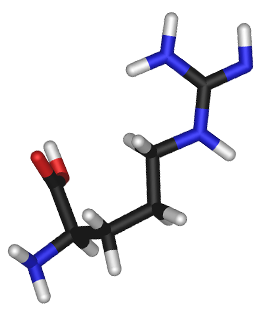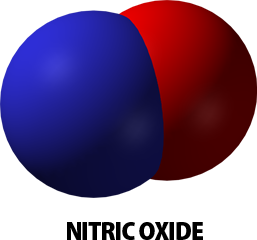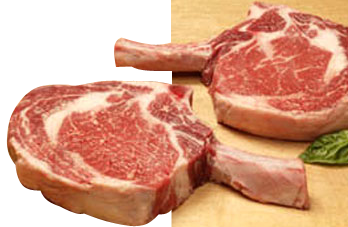Popular Articles
- Hair Loss Products - 25 Natural Treatments
- Advecia Supplement Facts
- Medications That May Interact with Advecia
- Review of Rogaine for Women
- Vitamin Deficiency and Hair Loss - The Facts!
- 14 Vitamins for Hair Loss & Thinning Hair
- Receding Hair & Beta Sitosterol
- Biotin for Hair Loss - Should You Try it?
- 6 Amino Acids for Hair Loss
- Sugar Linked to Increased Hair Loss Risk
- More Articles ...
 L Arginine and Thinning HairIn This Article
Thinking of using L-Arginine as a hair loss treatment? Here are some interesting facts you should know.
Several amino acids work to slow hair loss, and L-Arginine is one of them. It is often used in the treatment of male pattern baldness in the form of a topical application that promotes healthy hair growth. Amino acids are what protein is made of, and we need them for our health in general, including for healthy hair. They are extremely important for the body to have for it to be able to produce nitric oxide. When we think of nitric oxide, we often think of smog and pollution, but in fact, it plays an important role in our metabolism. It is produced in the linings of the blood vessels, causing them to relax. The blood vessels open up, allowing for the proper flow of blood. As we age, so do our blood vessels, and they become damaged. This leads to less production of nitric oxide, which in turn can lead to hair loss. What is L-Arginine?
While the L-arginine produced is usually enough for the body’s use, certain health states especially stress increase demand for the amino acid. Stress, trauma, sepsis, and aging are common factors that necessitate L-arginine supplementation to supplement the level of the amino acid synthesized in the body. L-arginine is a popular amino acid supplement in the bodybuilding industry. It is used for 4 main reasons: to quicken healing, to repair damaged tissues, to decrease blood pressure, and serving as a precursor of nitric oxide, an important vasodilator in the body. In medicine, L-arginine is often used or investigated for stimulating growth hormone, treating dentin hypersensitivity, sepsis, hepatitis, cirrhosis, and pre-eclampsia. How L-Arginine Effects Hair Loss
Minoxidil is a hair loss treatment that uses nitric oxide, although as a chemical analog instead of in its original gas form. L-Arginine can be used as a topical hair loss treatment, as it increases the level of nitric oxide in the body. L-Arginine can be found in certain foods, as well as over-the-counter supplements. Because L-arginine improves capillary blood circulation through the vasodilation attributed to its product, nitric oxide, it is believed that the improved perfusion of the cells of hair follicles contributes to hair regrowth by stimulating the production of new hair follicles. Therefore, L-arginine inhibits the chain reaction leading to weak hair follicle shafts and stunted follicle development. Dietary Sources of L-Arginine
Although L-arginine is synthesized in the body, its blood level from this biosynthesis is not always optimal especially in people on poor nutrition or undergoing physical stress. L-arginine can also be obtained from plant and animal sources. The amino acid can be found in the following plants: wheat germ, wheat flour, buckwheat, oatmeal, peanuts, granola, pecans, coconut, walnut, hazelnut, almonds, cashews, sunflower seeds, pumpkin seeds, sesame seeds, soybeans, and chickpeas. Animal sources of L-arginine include beef, pork, poultry, gelatin, snail, shrimp, lobster, halibut, tuna, salmon, milk, yogurt, cottage cheese, whey protein preparations, and ricotta.
L-Arginine SupplementationRecommended Doses
If you are going to take it as a supplement, it is best to start with small doses. To use an L-arginine supplement to stop your hair loss, start with 1 - 2 mg of the amino acid per day. If you develop no adverse reaction with that dose, it can then be subsequently increased up to 2 – 6 grams daily. Higher doses may be tolerable but should be used with caution. For example, a daily maximum dose of 16 g has been reported taken for as long as 6 months with no dangerous adverse effects. It is important to discuss the use of L-Arginine with your physician before you begin this type of treatment. L-Arginine is safe to use, as long as it is used properly, and in the right doses. Topical L-Arginine ProductsIn addition to foods and supplements, there are other products with L-Arginine that are used topically to promote hair growth. These include Hairmax MD Topical Hair Loss for Women, Spectral New Hair Loss Treatment Dnc from the makers of Revita, and Procerin XT Foam for Hair Loss. There are creams available, which are expensive and not yet FDA approved. These creams can be used to promote healthy hair growth but must be used with caution. A cream that is between two and five percent L-Arginine should suffice without being dangerous. It is not recommended for women who are pregnant or breastfeeding to take L-Arginine, and the creams should not be ingested by anyone. L-Arginine is available in grocery and health stores, and although there is no direct link between L-Arginine and hair loss, many do find that it is an effective form of treatment. Safety of L-Arginine SupplementsThere has been some testing of L-Arginine for hair loss on both humans and animals. The safety of products containing L-Arginine has not yet been clinically proven. Some things that have been noted are its use in treating burns, as well as coronary disease and even dental pain. L-arginine has been reported to trigger allergic reactions in some people. If you are taking this amino acid for hair loss, then you should watch out for these signs of allergies: rashes, itching, and shortness of breath. Since these symptoms are markers of an inflammatory reaction, people with asthma are advised against L-arginine supplementation. Furthermore, although most people tolerate L-arginine well, a few side effects have been reported. These include nausea, cramp, hypotension, and high blood sugar. Who Should Take L-Arginine for Hair LossSince most experts agree that the evidence for L-arginine use for hair loss is based on its proven effects in the treatment of other diseases and its use by athletes, the amino acid should be taken as an experimental treatment. This means that it should be combined with other known hair loss remedies to improve the outcome of any hair regrowth treatment. Furthermore, L-arginine is especially recommended for the treatment of hair loss in people who are taking it for other reasons. For example, if you are a bodybuilder or an athlete who needs L-arginine for muscle repair, speedy recovery, and improving your stamina, and you are experiencing hair loss, then L-arginine supplementation is definitely recommended. Still, other people can try L-arginine for hair loss. However, even though its mechanism of action is similar to minoxidil, it should not be treated as an outright replacement. Many successful cases show that L-arginine helps reverse hair loss when it is combined with other treatments. |
||||||||||||||||
| Next Article: 5 Hair Loss Forums & Websites |





 L-arginine is one of the 20 most common natural amino acids in the human body. It is called semi-essential amino acid since our body learns to synthesize it only after birth.
L-arginine is one of the 20 most common natural amino acids in the human body. It is called semi-essential amino acid since our body learns to synthesize it only after birth. Nitric oxide is critical for hair growth. It has vasodilatory properties that promote hair growth, and open potassium channels, which are also referred to as K-channels.
Nitric oxide is critical for hair growth. It has vasodilatory properties that promote hair growth, and open potassium channels, which are also referred to as K-channels. There are many dietary sources of L-Arginine, including low-fat dairy products, poultry products, beef, fish, and nuts.
There are many dietary sources of L-Arginine, including low-fat dairy products, poultry products, beef, fish, and nuts. There are also supplements available in capsule or powder form.
There are also supplements available in capsule or powder form.